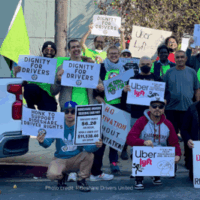Work should provide people with economic stability, safety, and the opportunity to contribute to their communities and connect with one another. It should be a place where workers are treated fairly and with respect. Good jobs should enable us to provide for ourselves and our families, and to join together to negotiate for ever higher standards.
But many corporations across the country are trying to take away the security and stability that a job should provide, by imposing the label of “independent contractor” on their workers and shifting risk and cost from the CEOs at the top to the workers who are central to the success of their businesses.
This isn’t just a label. Calling workers “independent contractors” deprives them of core rights and protections such as minimum wage, overtime pay, contributions to Social Security, the right to collective bargaining under the National Labor Relations Act, workers’ compensation, unemployment compensation, and protection from discrimination.
It is increasingly clear that misclassification is an issue of racial justice. Many poor workers of color and immigrant workers are stuck in a separate and unequal economy where they are underpaid, put in harm’s way on the job, and left to fend for themselves.
Misclassification of employees as independent contractors enacts an enormous toll on law-abiding employers and our economy. This paper tabulates the findings of myriad studies and audits that attempt to quantify the costs of misclassification.
Background: Misclassifying Employees as Independent Contractors
Employers in an increasing number of industries misclassify their employees as independent contractors, denying them the protection of workplace laws, robbing unemployment insurance and workers’ compensation funds of billions of much-needed dollars, and reducing federal, state and local tax withholding and revenues, while saving as much as 30 percent of payroll and related taxes otherwise paid for “employees.”
Misclassification can take several forms. Employers call employees “independent contractors,” even when the workers are not running their own businesses; they require employees to form a limited liability corporation or franchise company-of-one as a condition of getting a job; and they pay workers off the books, without any payroll treatment at all. Workers are frequently required to sign boilerplate contracts that include exacting standards directing the workers’ every move on the job, even while they state that the worker is “independent.” These practices are sometimes called “payroll fraud” because they are intentional and aimed at evading the law, defrauding workers, competitors, and the state. Legitimate business-to-business transactions are not payroll fraud, because true independent contractors have a specialized skill, set their own terms, and have invested in a business that enables them to earn a profit.
Employee misclassification is a persistent problem in many of our economy’s growth industries, including home care, janitorial, trucking, delivery, construction, personal services, hospitality and restaurants and, more recently, in rapidly growing app-dispatched jobs. State-level task forces, commissions, and research teams are using agency audits along with unemployment insurance and workers’ compensation data to document the scope of independent contractor misclassification. Confirming the findings of earlier national studies, these state reports show that 10 to 30 percent of employers (or more) misclassify their employees as independent contractors, which indicates that several million workers nationally may be misclassified. State and federal governments lose billions in revenues annually.
Download the policy brief to read more.



